The Peking Revolutionary Opera
All our literature and art are for the masses of the people, and in the first place for the workers, peasants and soldiers; they are created for the workers, peasants and soldiers and are for their use.
Mao Tse Tung
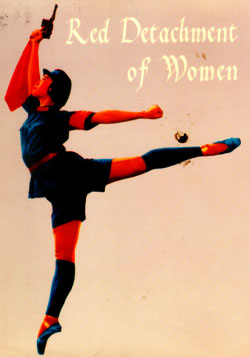
In her book, Red Azalea, Anchee Min describes her personal experiences with Mao's didactic creation:
"I became an opera fan. There were not many forms of entertainment. The word 'entertainment' was considered a dirty bourgeois word. The opera was something else. It was a proletarian statement. The revolutionary operas created by Madam Mao, Comrade Jiang Ching. To love or not to love the operas was a serious political attitude. It meant to be or not to be a revolutionary. The operas were taught on radio and in school, and were promoted by the neighborhood organizations. For ten years. The same operas. I listened to the operas when I ate, walked and slept. I grew up with the operas. they became my cells. I decorated the porch with posters of my favorite opera heroines. I sang the operas wherever I went. My mother heard me singing in my dreams; she said that I was preserved by the operas. It was true. I could not go on a day without listening to the operas. I pasted my ear close to the radio, figuring out hte singer's breaths. I imitated her. The aria was called 'I won't quit the battle until all the beasts are killed.' It was sung by Iron Plum a teenage character in an opera called The Red Lantern. I would not stop singing the aria until my vocal cords hurt. I went on pushing my voice to its highest pitch. I was able to recite all the librettos of the operas: The Red Lantern, Taking Tiger Mountain by Strategy, Sha-Jia Pond, The Harbor, Raid on White Tiger Regiment, Red Detachment of Women, Song of Dragon River. My father could not bear my loud wailing with the radio; he always yelled, Are you hanging yourself in the kitchen? (18)
In America, we think we have freedom of speech but how many of us are brainwashed by soap operas, sitcoms and the commercials that give us the eternal message to BUY THIS NOW. Our mass culture supports consumer capitalism, just as Mao's: "Revolutionary culture is a powerful weapon for the broad masses of the people. It prepares the ground ideologically before the revolution comes and is an important, indeed essential, fighting fron in the general revolutionary front during the revolution."
THE RED DETACHMENT OF WOMEN
Wu Ching-hua, daughter of a poor peasant, has been chained to a post in the dungeon of the Tyrant of the South, a landlord despot. Her eyes aflame with hatred, she will wreck this man-beast's lair at the first chance.
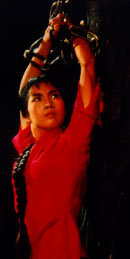
The outraged Wu Ching-hua escapes from the dungeon into the depths of the coconut grove.
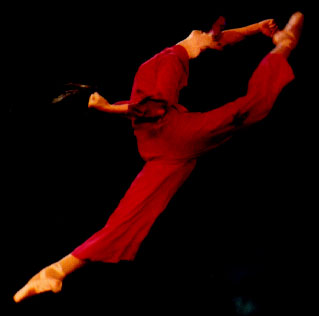
Red Army cadre Hung Chang-ching and his messenger Pang, disguised as peasants, are on a scouting mission.
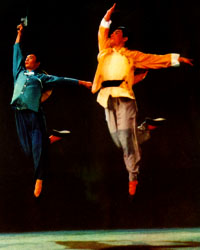
With deep proletarian feeling, Hung Chang-ching points out the revolutionary road for Wu Ching-hua.
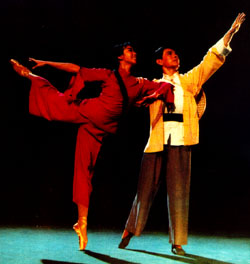
Wu Ching-hua angrily tells her dear ones of the Tyrant's heinous crimes.
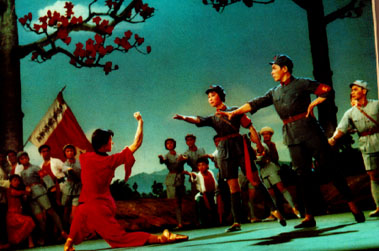
Hung Chang-ching, calm and dignified, in the disguise of a wealthy overseas merchant, arrives in the courtyard of the Tyrant of the South.
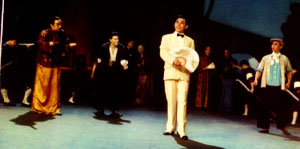
Hung Chung-ching leads the peasants in opening the Tyrant's granary and distributing the grain. The overjoyed peasants cheer: "Long live Chairman Mao!" "Long live the Communist Party!" "Thanks to our dear ones, the Workers'and Peasants' Red Army!"
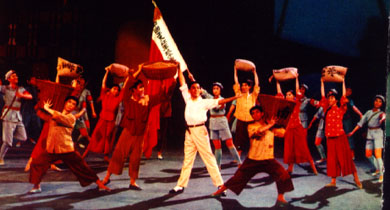
Wu Ching-hua has strong class feeling as she practises marksmanship and grenade throwing under the Company Commander's instruction.
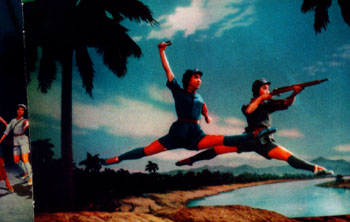
Soldiers of the Women's Comany perform rifle drill.
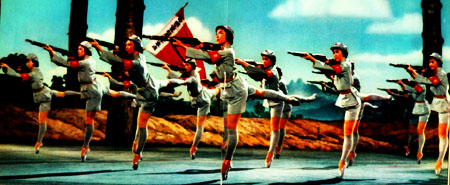
A storm rouses the wounded Hung Chang-ching. He rises and glares at the enemies surrounding him.
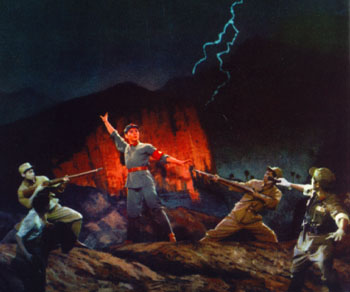
What does death matter? Communism is the truth! Hung Chang-ching towers over the enemies like an eagle in flight.
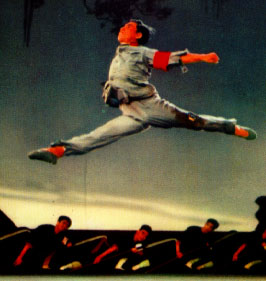
On the pyre, Hung Chang-ching shouts revolutionary slogans and dies a martyr's death.
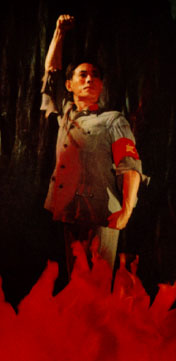
Wu Ching-hua knocks the Tyrant to the ground and threatens him with her gun.
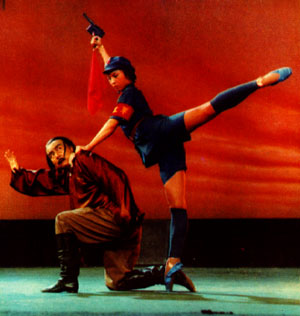
Wu Ching-hua and her comrades-in-arms mourn Comrade Hung Chang-ching; they resolve to carry on the cause of the fallen hero and wage revolution until final victory.
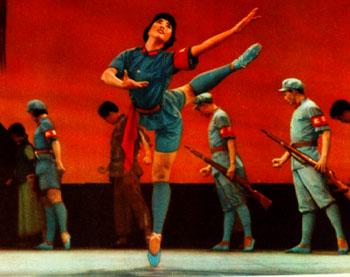
Although Hung has given his life, millions of other revolutionaries arise. Forward, forward! Under the banner of Mao Tse Tung, forward to victory!
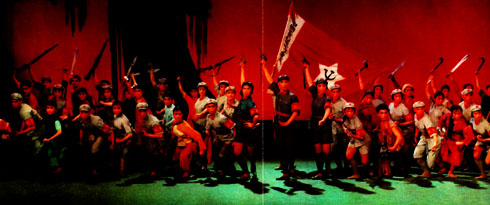
Women's liberation came to China way before the West. American and European ballerinas are still dressed as sylphs floating on the shoulders of their strong men. But China's ballerinas are so strong and independent they can carry rifles while they dance en pointe! For the Chinese, this art is didactic but also aesthetic and entertaining. Be aware of how each culture brainwashes with pomp and ceremony, including your own.
Back to Twentieth Century syllabus
Back to Home Page
The Red Detached Azalea
The problem with Brave New World is that there is no real leader to love the way I loved Mao. The masses do best with a collective oedipal transfer. Otherwise they solved the dilemma of aging and death rather nicely.
Thanks to Einstein I'm still alive. I had an affair with him and he told me how to live for another century. Every night I spin around as fast as I can while everyone else is sleeping.
William Styron should have spent a month farming when his "darkness" started to become visible. There is nothing like hard manual labor to beat off depression, especially when you are so privileged that you're receiving awards, you have an estate in the fancy part of Connecticut, and no problems compared to the other 99 percent of the human race.
Virginia Woolf was a great writer and intellect but not all women write with those flowery complex fluid erudite sentences. I like to punch mine percussively as if I were firing a gun. Mao was great but I didn't start to get a sense of humor until I had my affair with Mao II, Don DeLillo. Now, like Don, I can laugh at anything. China still needs a sense of humor.
Jean-Paul Sartre is another would-be proletariat who should have spent some time working at the Red Fire Farm. The dilemma of the Myth of Sisyphus isn't endless, repetitive work but the daily challenge with new little pleasures and surprises. Toni Morrison writes elegantly about slavery and I wonder what she would have thought of Mao's alternative. She is much better off writing all day while others work with their hands. No matter how intellectual I get, I will never give up manual labor. El Saadawi had both but she lost the most important thing. Thank God Einstein arranged for my sex drive to be rejuvenated as well. Lust is just as forbidden in America in the nineties as it is in China. The joy of lust is that it often is illicit.
If I ever go to Africa, I'll have to arrange for Einstein to give me a sex change. The most important thing I learned in China was the difference between what is necessary and what is superfluous. New York's consumer culture grows like greedy cancer but I know I don't need a car, a house, jewelry, make-up, fancy clothes, travel expenses, children, gourmet food, poisons like alcohol, cigarettes, red meat, coffee, drugs, but I could use medical insurance and a one bedroom apartment. Intellectuals and artists are banned internationally -- in China, Russia, the Middle East and America.
The only time I was completely approved of was when I was created the Peking Revolutionary Operas for my people and then I was only paid with praise and power, never luxuries. If I had to believe in God, he would be the God of Small Things. Einstein tried to wrestle with the Big Things and he died. Even the Virtual God of Cyberspace will eventually crash into a black hole. And Allah already Died by the Nile.